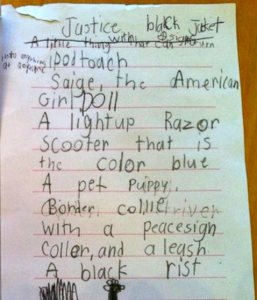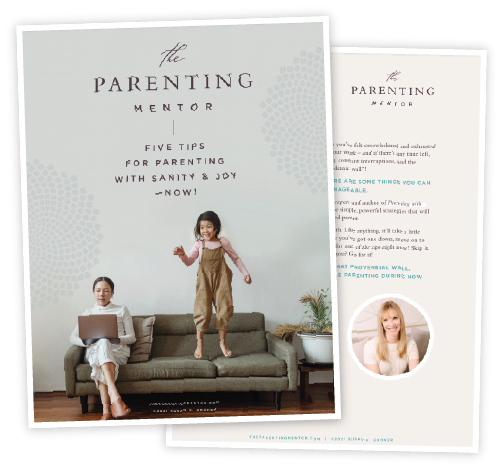WELCOME TO THE
PARENTING MENTOR BLOG
Pardon the Interruption – What to Do When Your Child Constantly Interrupts You

It’s tough being a parent. Then your cell phone rings and what happens next? It’s like a magnet and your child instantly wants your attention.
Cue the South Park, “Mom, Mum, Mommy,” episode where Stewie is standing beside his mom who is lying in bed as he repeatedly calls her name over and over.
I don’t know a mom who doesn’t feel like that at certain times.
Many times kids interrupt because they are craving attention and feel like they aren’t getting enough. And when you don’t get what you want, you crave it, right?
It can be gut-wrenching to be torn between needing time for work or self-care and trying to take care of your kids.
That doesn’t mean you need to feel pressure to spend the entire day together or go out for a fancy meal. Just taking 15 minutes together to talk and laugh daily can make a big difference. It makes kids feel loved and secure.
Many experts say the general rule is spending a minute of time for every year of life, so seven minutes for a 7-year-old and 15 minutes for 15-year-old.
Here are some strategies to make it easier and reduce interruptions.
- Flip the script
I think it’s really important we let our kids know that they are important to us. But it has to be done in the right way.
It’s easy to get annoyed when being interrupted.
Instead of saying, “I know you want to spend time with me, I just need 15 minutes to finish up what I’m doing,” flip the script. Shift how you are communicating with your kid to make them feel like they’re not annoying and irritating you.
Be joyful and trying saying something like: “I really want to spend time with you. I really want to hear what you’re saying. I really want to help you with your problem. Or, I really want to play with you… I need 15 minutes to finish this up. And then I can't wait to do that with you.”
Treat it as your special treat for finishing up work.
That helps you and your mindset when you say it like that. It does make a difference.
- Plan for “kid time” in your calendar
Just like planning out meetings and date nights, you have to plan for moments like these in your calendar. Literally, block out time in your calendar that is scheduled to interact with your kid. It doesn’t have to be a lot of time, like playing with them for an hour.
Rather find 15 minutes to devote to them to do whatever they want that’s being incorporated throughout the day.
When they get bits of you, you’re making it special and it’s not an imposition. Otherwise, it’s easy to become disgruntled and say something like, “Fine, I’ll play with you when I’m finished doing everything.”
If you proactively schedule time in for your kids, you’re not going to be stressed out wondering what your day is going to be like, how many times you’re going to be interrupted and feel guilty.
For the record, all parents feel that way when we can’t be with our kids and they want us.
When my kids were younger and I needed to do quiet work, I used to say, “You’re welcome to come in and work alongside me, but it’s a no talking zone” and then specify the amount of time.
- Create a sign for the door
This sounds simple, but it’s work. Try and work in a room with a door you can close. Have a little sign on the door with a picture of a phone to signal you are working. Or, if your child is younger, put something green or red on the door, like a stop sign or a traffic light.
I would tell my own kids, “Everyone needs privacy and quiet time. When you’re in the middle of doing something I want you to have a sign too.”
Let them have a sign, they’ve picked and let them use it. They’ll begin to understand it’s not just mommy saying “I can’t come talk right now,” but something they can do too.
- Give your kid a notebook
Once your kid can draw or write, give them a special notebook with a pen or colored pencils.
Make it a special thing, that every time they think of something they want to share with you, ask them to write it down or draw out a picture.
You can say, “Here’s your special notebook for you and me. Whatever you want to tell me is important and I don’t want you to forget, so I’m giving you this notebook.”
By doing that, you’re giving your them control. Kids interrupt because they want that immediate gratification or they’re afraid they are going to forget. This is a way for them to have less of a need to interrupt.
5. Ask your child to rank the importance of a conversation
As kids write things down, ask them to start ranking and judging what they want to discuss based on what is most urgent.
That doesn’t mean that something that isn’t urgent isn’t important and that you’re not interested.
But suggest tackling the urgent ones first. Do this with yourself and your kids. If you say, “I have five things to talk to you about, and this one is the most urgent,” it helps.
Mirror what you are asking your kids to do. Think of it this way: Your teenager only has a little time to talk to you, so how are you going to decide what you want to talk about?
By doing the same thing, you are showing you respect your kids and you’ll get some in return.
Looking Back at My Full-time Mom Years


5 Parenting Book Recommendations That Won’t Stress You Out!
Finally! Life is getting back to a natural rhythm again. Schools are reopening, many sports and recreational activities have resumed and summer is on the horizon. This all means that for the first time in a year you may actually be able to find some real time to yourself. After you catch up on some long awaited self care and dinner dates, you may actually be able to get back to reading some books for leisure. I am sure many parents would agree that parenting in a pandemic has been like a spotlight on the best and worst areas of your family dynamics. Maybe you yell more than you thought or have less patience and tolerance than you’d like Whatever you realized let it be 1) A judgement-free observation and 2) An invitation to improve.
CAUTION! Don’t make this a chore – you already have plenty to do, so approach this in bite-sized chunks that feel manageable for you. To get you started, I put together a short list of books
that have been helpful for me over the years. These books informed much of my own parenting philosophy and have stood the test of time. I hope they can be of some value to you. (They are listed in no particular order.)

Before diving into the list of books from other authors, I first want to recommend my book, Parenting with Sanity & Joy not only because I wrote it, but because of the reason I wrote it. I know that while you may want to learn all about every parenting style and the theories and research behind them, the reality is – you don’t always have that kind of time. For me, it was confusing and disheartening. Rather than help, the plethora of parenting books, many of which I never even finished, made me feel as if I wasn’t doing a good job of being a parent and had already negatively impacted my children. My book provides you with easily implemented strategies to help you parent with sanity and joy! you need in the most condensed manner possible. The book is a compilation of 101 parenting tips and it can be read one tip at a time, used as a reference and as reinforcement. Each tip is brief enough to be read in one bathroom break or while you’re waiting for your coffee to brew!
Okay! Let's dive in to my parenting book recommendations:
- Siblings Without Rivalry by Adele Faber and Elaine Mazlish– The subtitle of this book is “How to help you children live together so you can live too” – which let’s you know the authors “get it”. Children constantly yelling and bickering with each other and running to you with their issues day after day definitely leads to frustration for everyone. It sure did for me - and this book allowed me not to play parent referee. I especially love this quote: “The family is where we learn our relationship skills. And the way we relate to our children and teach them to relate to each other, even in the heat of battle, can be our permanent gift to them” It reminds us that teaching our children to resolve conflict helps them build strong relationship skills – and gives us some moments of peace to breathe and regroup throughout the day – WIN/WIN!
- How to Talk So Kids Will Listen and Listen So Kids Will Talk also by Adele Faber and Elaine Mazlish. As you can see, I love these authors! The concepts covered in this book are not only work when communicating with children, they are also helpful as you communicate with the adults in your life.. “When we acknowledge a child's feelings, we do him a great service. We put him in touch with his inner reality. And once he's clear about that reality, he gathers the strength to begin to cope.” While the first edition of this book was written almost four decades ago – it’s still incredibly helpful and relevant today.

- The Blessing of a Skinned Knee: Raising Self-Reliant Children– along with it’s companion for when you have teens - The Blessing of a B Minus, both by Wendy Mogel. The theory of these books is that parents, in an attempt to give their children the best or better than we had it, have shielded them from “the worst” or even anything negative. “Real protection means teaching children to manage risks on their own, not shielding them from every hazard.” This book helped me to allow my kids to develop resilience and problem-solving skills.
- How to Raise an Adult – Break Free of the Overparenting Trap and Prepare Your Kid for Success” by Julie Lythcott-Haims. One of the things I gained from this book’s guidance is “freedom”. In the early years of raising my kids, I thought that I was a good parent by doing everything for my kids and constantly being by their side. . This book served as a strong reminder that my goal was to raise children who would be capable, independent adults. “We’re depriving our kids of the chance to do the work of life for themselves.

BONUS: If you learn best by knowing what NOT to do, I have a book for that too - lol. Ironically enough, this book was given to me as a gift from my Mom. "How to Traumatize your Children. 7 Proven Methods to Help You Screw Up Your Kids Deliberately and With Skill." If nothing else, it’s sure to make you laugh!
I’d love to add to my list. What books have helped you grow as a parent? Comment below.
Letting your Children Set Their Own Course and Career Aspirations

I’ll never forget the day my daughter, then a sixth grader, came home from school with such excitement from learning about genetics in her science class. A friend recommended she read The Seven Daughters of Eve (not a children’s book) which she devoured, solidifying her desire to become a geneticist.
Over the next year or so, she’d talk to our friends about it. Her interest and her precociousness impressed these adults and I’m sure my daughter loved the adulation. As she talked about what she wanted to do when she grew up, I’d always let her know that she was free to change her mind- until one day when she asked me, “Do you not want me to be a geneticist?” Confused, I asked her what made her think that and she replied it was because I kept telling her that in fact, she didn’t have to be one.
Cut to last week. My now 23 year old daughter graduated with a Master’s Degree in Genetic Counseling and another Masters in Bioethics. During the (virtual) ceremony, there was a moment when I cried. I was overwhelmed by that 12 year old memory and how her passion, goals and determination - high school science research, an undergraduate major in biology, internships, and grad school- have led her to this place. And I am so proud!
Sometimes we may question our children’s ambitions or push them to fulfill them. Here are a few tips things to think about along the way:
1. Encourage your children to explore and learn new things --but allow them their current passion too. Let your child lead here. The joy for you comes in watching as your child’s interests and passions develop and evolve.
2. Never shoot down their dreams. This may sound obvious. What sort of parent would dismiss their child’s aspirations? While no parent would do this on purpose, you’d be surprised how many do this unintentionally. This includes saying things like “You’re too young to know what you want to be when you grow up!” Or “Everyone thinks they want to be an astronaut when they're little,” or “Being an inventor takes a lot of creativity and there’s no guarantee you’ll be successful.” Even well-meaning advice can discourage them from pursuing what they’d been excited about.
3. Allow them to change their mind. Even if you’ve invested time and money in your child’s passion, and your child has been focused on this one thing, how great it is for them to recognize that it’s run its course. My daughter took up figure skating for a few years. She kept moving up levels, winning competitions, etc. But then she was done, and that was okay! I wanted to be a doctor until my senior year of high school and then pivoted to business and marketing. This is a gentle reminder to be supportive of the changes!
The Pandemic Anniversary: Commemorating Hard Things as a Family

“Starting tomorrow, you have to stay in your house for a year. Your kids won’t be able to go to school. You’re going to have to try and do your job from home. You won’t be able to see your friends or any of your family that doesn’t live under your roof. Forget about holidays and vacations and anything you had planned in advance for. Cancel it all; it’s not happening.”
If someone had said those words to me a year ago, my family would have said, “No. We can’t. We won’t be able to do that for a year.” But we did. And so did you.
Of course, it happened more slowly, with new information trickling in every few days. But those early March messages were grim – especially in the New York City area, where I was receiving them.
Obviously, things evolved in the coming months. We did leave the house – for walks and, eventually, groceries. We were able to see a doctor if we needed to. We figured out how to visit grandparents in a way that was safe. We reevaluated what was most important and modified established ways of doing things based on ever-changing information. We called upon our ingenuity and our flexibility and tried to keep our growing list of sorrows and disappointments in perspective.
This is what it means to be resilient.
We all try to teach our kids resilience as we raise them – reframing events like losing a soccer game or not getting a part in the play. We explain to them that it’s okay if not everything goes the way they had hoped.
And now, a year later, after they have had countless opportunities to practice those lessons, we need to let our kids know that they’ve done a great job.
It’s important for kids to recognize their own ability to be flexible and to cope.
And so why not put aside some time to talk to your children about how they were able to come through what may be one of the toughest in their lives.
It doesn’t matter the child’s age – whether two or twenty-two, this was a year of extraordinary loss. Maybe they’ve had to experience the grief of losing a loved one, maybe they’ve weathered the sadness of not seeing friends. Some children have suffered only the disappointments of cancelled birthday parties and cancelled vacations. Many others have suffered much worse.
But loss is loss, and no matter what type of loss your child has experienced, I assure you, it has not been easy.
When we take time to explain to our children how getting through hard times makes us more capable of getting through future hard times, it allows them to see life’s unavoidable challenges as something they’ll be able to handle.
When we name and acknowledge our resilient actions and attitudes, it allows us to draw upon those lessons with more confidence in the future.
For my part, I am planning a night of reflection for my family, where we will all talk about the events that were hard – and the moments that brought us joy (thankfully, we’ve had many!). We will take time to notice the ways in which we were able to adapt. I will challenge my kids to say those things out loud, so they can really take in the many ways that they’ve contributed to their own resilience.
I’m also planning on having a loud pot-banging session, reminiscent of the 7p.m. New York City ritual of opening up the windows and cheering for the hospital workers as they changed shifts. I want to commemorate the moment with something noisy and strong. We’ll be on Zoom together, as my kids are in different states again. We’ll each have a pot or a pan, a metal or wooden spoon, and together we will create a cacophony to mark an anniversary that no one ever thought we could reach.
Maybe you’d like to join us!
5 Ways to Prevent Middle Child Syndrome

Middle child syndrome is something that I've been thinking about a lot lately as so many parents I know have, or are just about to have their third child. And they're all stressing about how their family dynamics are going to change. "Two children is so manageable!" "I only have two hands!" "I'm afraid one of my kids is going to feel left out." "Everything seems made for two - even bunkbeds!" are just a few of the concerns I've been hearing.
And yes! There is a big shift with the introduction of your third. Suddenly your second is no longer the baby while your oldest retains their position as most grown up. Inevitably, there is a middle child.
More often than not, we warn parents of future issues like the "terrible twos", "sassy tweens" and you guessed it, "middle child syndrome". Yet, these things often happen not from destiny, but rather because of how we treat our children.
Here are some strategies to consider if you are worried about your middle one feeling middle child syndrome:
Ditch the labels Refrain from "my first born" or "my baby" and call each of your kids by their given names or your pet names for them.
Monitor praise If you've read my book, you know that this tip (#49) talks about keeping praise centered around your child's own experience and process rather than parental feelings around the outcome of success. To build on this, try to avoid specific kudos based on comparison to siblings. Even the subtlest comments of "Look how fast the baby is learning to crawl!" may imply that your second wasn't quite as accomplished at that age.
Avoid blame When it comes to sibling rivalry, we often tend to blame an older child and encourage patterns and thoughts around which child is loved more with phrases like "You should know better!" or "Why did you do that to your brother?" (Check out my thoughts and tips on this here.)
Follow their lead With a younger sibling now in the picture, your middle child may try to act more grown up; more like their older sibling. Sometimes the same child will want to be treated more like a baby. If you can, give your child what they need and don't be surprised or worried as they navigate these different roles throughout their childhood. (Btw, this is fairly common to see in all children.)
Focus on the individual child Spend a little bit of alone time with each of your kids as often as you can. Even 15 minutes of focused time makes a difference. No phone. No multitasking. It could be imaginative play, snuggling with a book, or even watching some fun Tik Tok videos. Additionally, give each of your children age- and/or ability - appropriate privileges and responsibilities and offer up opportunities for all your children to participate in activities in and out of the home without a designation of birth order.
Bottom line - keep treating all of your children as special members of the family!
Your 3-Step Plan to Avoid Temper Tantrums When Shopping

It’s a scenario many parents dread: Your child throws a major temper tantrum in the middle of a store, because they can’t have a toy or a treat or even a random item strategically placed on a low shelf. What if I told you there’s a way that prevents this from happening (almost every time)?
Think of it like this: Even as adults, we don’t like to be blindsided or be hoping for one outcome only to get another. It’s similar for your children: When you make them a part of the planning process so they’re not (unhappily) surprised, they’re able to better cope when things don’t go their way.
To prevent a meltdown, I advise parents to follow this easy three-step plan with their children.
Step 1: Tell them the plan the day before
Advanced planning is key! Share your “mission” and let your child actively engage in creating the plan.. You can say: “We’re going to Target tomorrow. Would you like to help me make the list?” (This works great for grocery shopping as well.)
As you make the list, explain how the trip will go. “We’re going to get these five items on our list, and nothing else. Will you help me remember the list and stick to it?”
Step 2: Remind Them in the Morning
The morning of the trip, reinforce the message before you go: “Let’s make sure Mommy’s list is in her purse! Remember you’re going to help me get these five items and nothing else. I’m so glad I’ve got you as my helper.” You can repeat the plan again in the car on the way to the store.
Step 3: Find Other Ways to Make the Trip Fun
At the store, make shopping a game. Say, “How quickly can we get the five items on our list? Let’s go!”
If your child mentions wanting to stop for a toy, validate and relate to their feelings. “I’d love to get some fun things, too; but today, we agreed we are sticking to the list.”
If you take this approach each time, your child will learn what happens when you go shopping, and not be surprised that there isn’t a toy involved. And if they do have a meltdown once in a while? Make sure to validate how hard it is not to get something you really want when you want it. And add: “I’d like to buy something new too, but I’m not going to either.” You can even take a picture of your child holding the item and say, “Let’s add this to your birthday/holiday gift list.”
The more you practice this method, and the more you repeat the plan, the easier it will be for all involved and those dreaded shopping trips will be efficient and may even save you some money in the process!
4 Ways Parents Can Deal With Sibling Rivalry

When I was pregnant with my second child, I vowed to do everything I could to avoid sibling rivalry and make my children be kind and loving to each other. The thought that my kids would bicker, hit or be mean to one another was not a pleasant one! But--bicker they did! There was even a little hitting and hair pulling.
Most of the time I told them to take it somewhere else, as nobody likes to listen to people arguing. Often, that was enough to get them to stop. I utilized the strategies below to minimize the negative feelings that siblings may have toward each other, and for the most part, they worked.
Struggling with sibling rivalry in your home? Keep these four tips in mind:
- Don’t Get Involved (Really)
One of your children comes running up to you, ready to report what the other one did wrong. What next? The best thing you can do is not get involved--truly.
Coming to you is actually a tactic: one child wants to confirm for themselves which child they think their parent loves more. And sadly, that’s how they’ll interpret it when you take sides.
Over time, a pattern forms. Child A antagonizes child B; child B responds; child A tattles to you--and if you punish child B, they both think you love child A more. Clearly, that’s never the result you’re going for.
The good news is: You can help your children avoid this spiral. Start with an “Oh.” Then you can add something back like: “I’m sure you can figure it out.” The child reporting to you will see the lack of a reaction, and annoying their sibling will instantly become less interesting.
- Do Allow for Space
It’s only natural for people to get on each other’s nerves--especially now. If you’re homeschooling or Zoom schooling, your kids could be with each other 24 hours a day. It’s important to remember that no matter how much we love each other, we can get tired of being together--and that’s okay.
Teach your children to ask for some alone time. What matters is that they ask nicely. There’s no need to say: “You’re getting on my nerves, go away.” Instead: “I’d like to play by myself for a bit.” or “I need some alone time now.”
Remember, you can model this, too. Tell your children when you’d like some time to yourself as well.
- Don’t Make Every Purchase About Both Children
Intuitively, it may seem like a tactic to avoid sibling rivalry is to always create parity with everything that you buy for your children. There are some times when this makes sense. (If you go on a trip, you’ll bring things back for both children, not one or the other.) However, in general, giving each child what they individually need tends to be more effective--not to mention smarter financially!
In practice, this means that if one child needs a new soccer ball or pajamas, there’s no need to make sure that the other child also receives something new. If you get a “Why didn’t you get me something too?”, reassure them that each child gets what they need when they need it. This helps your children see that there’s no preferential treatment.
- Do Encourage Sharing--The Right Way
Yes, we want to teach our kids to share with each other. But there’s a really important caveat: Not every toy has to be shared. Expecting your child to share everything (with a sibling or on a playdate) is unrealistic and unfair.
Kids feel more comfortable when they’re allowed some autonomy and control over their world, and this includes their things. Empower your child to have one or two toys each week (this can change) that they don’t have to share.
A great way to execute this in practice is to give each child a “non-sharing” box. They get to take the things they don’t want to share that week and keep them in a special bin in their room. This way they’re not taunting their sibling; plus, once they’ve been given control of the non-sharing toys, they’re able to accept that everything else is fair game.
Sibling rivalry is something many parents worry about. But implementing these simple strategies can alleviate friction and help your children know they’re equally loved.
6 Rules for Stress-Free Gift-Giving

When it comes to giving gifts, there are more questions than you might realize: What counts as a gift? Are there strings attached? What are our own expectations about how the gift is received or used? Or how it should be treated?
In my experience, taking a moment to think about some of these questions has been very helpful, both in gifting to my own kids (no matter what their age), as well as to anyone else.
To me, a gift is just that – something I give to someone with no expectation of anything in return. It is when we start piling a lot of expectations – onto ourselves or onto the recipient – that we create undue stress around gift-giving.
When I follow these 6 rules, giving gifts is so much more fun:
- Create Guidelines. Whether it’s the number of gifts, or the budget for a particular holiday, knowing what your guidelines are up front allows for more clear decision-making. Share the guidelines with your children so they know what to expect when they make their wish list. For young children, it might be one “big gift” and a few “little gifts.” Consider sharing their list with grandma and grandpa, aunts and uncles. This can relieve some of the burden on you as a parent.
- Avoid Judgment. Kids don’t feel good if they think you don’t like the things that they want. If you have a concern or question about a particular item on the wish list, try asking your child about it. “I looked at your list, Sweetie. What is it about a wind-up Chihuahua that you really like?” When you invite your child to talk about what they want, you’re getting a window into their excitement.
- Make Peace with Impracticality. Most parents try to sneak a little practicality into some gifts – like that winter coat he needs anyway.However, part of the fun of getting a gift is receiving something you don’t necessarily need. If your child does need some new, practical thing, maybe let them pick out something a little out of the ordinary. For instance, instead of a plain pair of new sneakers, let them choose special ones – pricier or more whimsical — that you wouldn’t buy for them otherwise.
- Give Without Expectations. Imagine how you’ll feel if that beautiful sweater you bought your daughter ends up in a ball on the floor of her closet. If that makes you angry, you have an expectation. A true gift is something the recipient can do with as she pleases. She can lend it to friends, she can resell it, she can cut it up if she chooses. This is a tough one, but one that will ultimately bring you a lot of peace.
- Respect What’s on Their List. If your child wants a blue truck, just do your best to get her the blue truck. It doesn’t matter that the red truck w
 ill go better with her bedroom rug. She doesn’t want a red truck,Mom. She wants blue.
ill go better with her bedroom rug. She doesn’t want a red truck,Mom. She wants blue. - Consider Experiential Gifts. In my family, we often use gift-giving as an opportunity to do something special as a family or for the kids to try an activity they’ve never done before. Maybe everyone goes to the circus or to a show — Sesame Street Live, or Frozen on Ice. For older kids, how about tickets to see a favorite band? One year my entire family went skeet shooting! Looking forward to an event and the memories it generates extends the joy of giving. And, don't forget about experiences right at home. Your kids will love turning in "coupons" for special activities with you.
Finally, don’t forget gifts that give back. Maybe each child gets to choose an organization and you all make a family donation to a good cause. This is a great way to help your kids to grow their gratitude muscles and think about how to help others (a known recipe for long-term happiness). Help younger kids find organizations based on things they care about. Do they want to help animals? Children in the hospital? The environment? Veterans? If you’re donating food or time, bring your kids with you. It’s an incredible opportunity for them to partake in gift giving, too.
Updated December 2020
What to Know Before You Buy Gifts for your Teens

I’ll never forget the time that I was having lunch with my new friend, Jane, who was in a quandary about a holiday gift request from her teen daughter. Jane had asked her for a wish list, and what she got back was a “list” with a single item: a phonograph.
If you’re old enough to know what a phonograph is, just reading that word may leave you nostalgic. When I was young, we all had phonographs. It was how we played music – LPs to be precise. Over the years we collected the records of our favorite artists, and we treasured them.
At the time,Urban Outfitters offered a rather cool-looking phonograph.
Jane did NOT want to buy it for her daughter. She was certain it would end up in the closet along with the skateboard and the guitar — two previous gifts that were barely used and then forgotten. Why buy a gift she knew would be a waste?
As she told me all this, I was a bit envious. I imagined my teen daughter asking for a phonograph and instantly thought of how great it would be for both of us:
- She would be listening to music in a communal way, rather than on her phone.
- She would experience what I had at her age – placing an LP on a turntable and watching the needle gently touch down into the first grooves of the vinyl as the record spun.
- I could pull out the albums I had saved from my high school days and we could listen together.
- She and I could go to record stores together and flip through the albums; I could share my favorites with her.
In our attempt to be good parents, many of us fall into the trap of feeling as though the gifts we give our children need to be useful – or at the very least, utilized! I don’t know about you, but this idea usually leaves me feeling stressed or disappointed, two feelings I try to avoid whenever possible.
The truth is, I might buy my daughter a cool retro phonograph and none of the benefits I imagined may come to pass. And that’s okay. Parenting with love means knowing that a gift is simply a gift – something we give just for the sake of it. It’s a way of letting people we care about know they’re important to us.
My conversation with Jane inspired me to put together my own gift-giving guidelines for parents. When I can follow even most of them, the holidays are more fun and I’m a happier mom.
Updated December 2020



